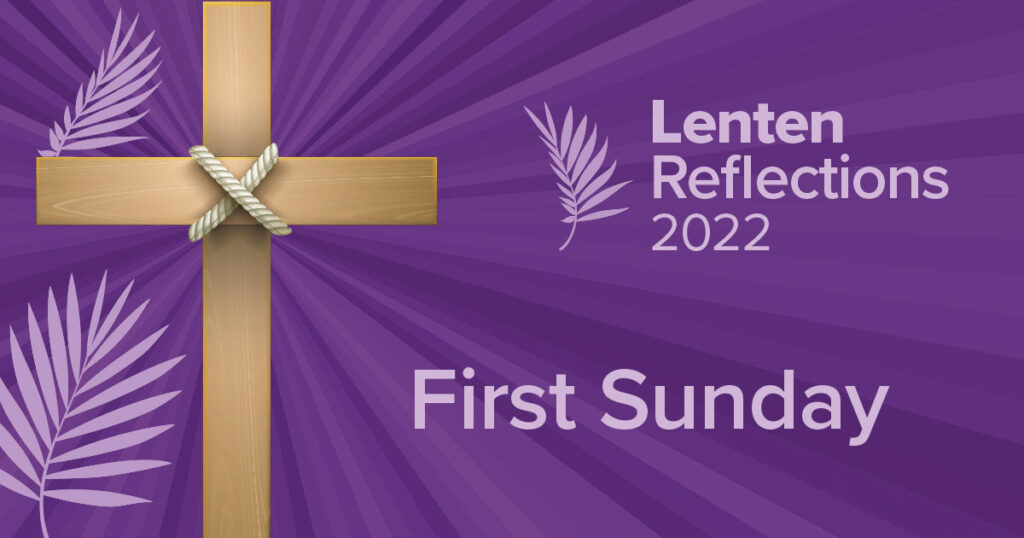
Carnival’ or ‘Pancake’ or ‘Shrove Tuesday’, followed by ‘Ash Wednesday’, new resolutions, and now the First Sunday of Lent: Lent has begun. Many other religious traditions also set aside times for specially intense reflection, prayer and fasting. Muslims, indeed, make greater demands on their followers than most of us Christians make upon ourselves these days. What is going on, or what is supposed to be going on? I would not speak for Muslims, but at least for me and at this time of my life, I welcome the opportunity to stop and think, to take a second look, to remember who I am. For me, it’s important that I do it not on my own but with you, my brothers, as part of a community. And it’s helpful to reflect on these ancient passages of scripture on which the Church has been pondering for thousands of years. Just think: most people on this planet get no such chance. For some, of course, it’s just meaningless. But for most, earning a living or just surviving takes up all their time and energy. I like to think that I am keeping Lent partly at least for all who cannot.
I think Luke puts forward his account of Jesus’s forty days in the wilderness as a kind of programme for this kind of reflection. The others tell it differently, but Luke gives his own spin to an old story. (John, of course, doesn’t tell this story at all: he could not possibly show The Word being tempted.) Mark’s version, very brief as usual, says nothing of the content of the temptations, but has one very shocking detail. He alone tells us that the Spirit – the same Spirit that came down upon Jesus at his baptism in the Jordan, with the words, ‘You are my beloved Son’ – that is the Spirit that, Mark says, immediately drove him [Jesus] out into the wilderness. Drove him out! What father drives his beloved son out into the desert? Let the bitterness of that word “drive” sink in for a moment. The Greek word Mark uses means ‘thrust’, perhaps even ‘shoved’ him out into the desert. What struggle was raging within Jesus, within the Son of God, that he had to be shoved?
But to return to Luke: for him, as we’ve just heard, Jesus, full of the Holy Spirit […] was led – not driven but gently led – into the wilderness. Luke, I think, means for us to follow along behind Jesus. It’s an invitation to join Jesus in the wilderness for forty days. Not just thirty but forty days: a long, Long Retreat, in daily life, with him. And under the retreat direction or mis-direction of Father of Lies, the devil himself! He starts us off, as always, with the Principle and Foundation, but with a typically devious twist. If you are the Son of God, he hisses, command this stone to become bread. He means, “Who do you think you are? And who is this God whose ‘son’ you claim to be?” And that surely is a good place to start the Spiritual Exercises. Who am I? And when I claim to be a child of God, a companion of Jesus, what exactly am I claiming to be? Who is it I say is my Father? Jesus’s answer to these questions takes all of us back to the beginning, the first principle and foundation of what we call, so lightly and unthinkingly, our ‘faith’. For who am I – what are we – if not creatures who live, breath and exist not by bread alone but on every word that comes from the mouth of God? We are created, Ignatius reminds us, to “praise, reverence and serve God our Lord, and by this means to save our souls”. And for absolutely nothing else. Our true food, that on which we live not just for a day but forever, comes from the mouth of God: it’s the Word through whom all things, us included, came to be on the First Day.
Next, our director leads us into the Second Week, and the meditation on the Two Standards. But again the bad spirit presents it in a tricksy way, cunningly disguising his own deadly kingdom as that of Christ. Here is no great throne of fire and smoke, no billowing clouds reeking of sulphurous decay, no legions of innumerable demons seeking whom to devour, as Ignatius paints it in the Exercises. Instead, spread out before Jesus, and ourselves, are all the kingdoms of the world in a moment of time: a beautiful panorama. To you, the devil promises, I will give all this authority and glory… If you, then, will worship me, it shall all be yours: all of it, “riches, honour, and pride”, in Ignatius’s words. Compare with this “the address which Christ our Lord makes to all His servants and friends whom he sends on this enterprise, recommending them to seek to help all, first by attracting them to the highest spiritual poverty, and should it please the Divine Majesty, and should he deign to choose them for it, even to actual poverty…” Or as Jesus said, more simply, You shall worship the Lord your God, and him only shall you serve.
Our retreat mis-director, having failed again, moves us quickly on to the Third Week, the passion. Imagine, he says to Jesus, use your senses: you are on the pinnacle of the temple and you cast yourself down from there, smashing into the ground. Is your God going to stand back and watch you die? What if these people here reject you and try to kill you – what will you do? Will you simply allow your so-called ‘Father’ to abandon you in your agony on the cross? Here, it seems, the Word of God is brought almost to speechlessness: You shall not tempt the Lord your God is all that he can say. Or, as he said the next time that same tempter came to him in the Garden, not my will but yours be done. With that the devil gives up and departs, but ready to return at an opportune time; Jesus is left to enter the Fourth Week on his own, and we must follow him.
Jesus returned in the power of the Spirit into Galilee, his heart bursting with the Good News and longing to share it with others: for, as Ignatius puts it in the Contemplation to Attain the Love of God, “the lover gives and shares with the beloved what he possesses…” The Spirit of the Lord is upon me, he declares in the synagogue in Nazareth, because he has anointed me to preach good news to the poor. He has sent me to proclaim release to the captives and sight to the blind…
Stephen Buckland SJ
Arrupe Jesuit University, Harare, Zimbabwe
In the Chapel of the Holy Name AJU,
